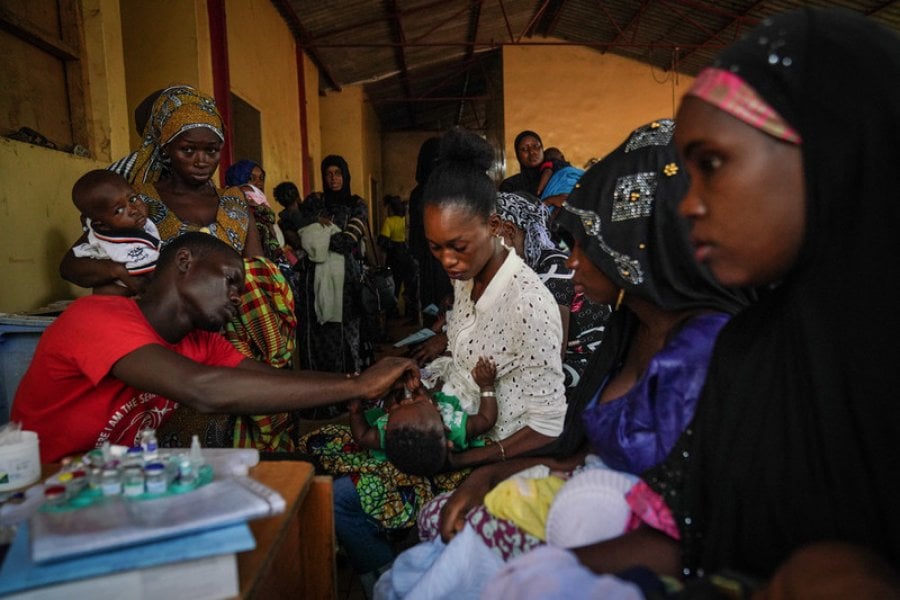Modelling suggests mass vaccination campaigns during SARS-CoV-2 epidemics should not be cancelled if adequate risk mitigation measures taken
17 August 2021 London School of Hygiene & Tropical Medicine London School of Hygiene & Tropical Medicine https://lshtm.ac.uk/themes/custom/lshtm/images/lshtm-logo-black.png
SARS-CoV-2 infection risks during mass childhood vaccination campaigns can be greatly reduced by adequate personal protective equipment (PPE), symptomatic screening and appropriate campaign timing, according to new research in BMC Medicine.
The study was led by the London School of Hygiene & Tropical Medicine (LSHTM) in collaboration with Bill & Melinda Gates Foundation and UNICEF. The team modelled excess SARS-CoV-2 infection risk to vaccinators, vaccinees and their caregivers resulting from vaccination campaigns delivered during simulated epidemic scenarios in different parts of the world.
In the most pessimistic scenarios modelled, a campaign conducted at the peak of a SARS-CoV-2 epidemic with high prevalence and without special infection mitigation measures could increase excess infection risk by 32% to 45% for vaccinators, and 0.3% to 0.5% for vaccinees and caregivers.
However, these risks could be reduced to between 3.6% to 5.3% and 0.1% to 0.2% respectively by use of PPE that reduces transmission by 90%, as might be achieved with N95 respirators or high-quality surgical masks and symptomatic screening.
The researchers say their study suggests childhood vaccination campaigns against diseases like measles and polio during SARS-CoV-2 epidemics should not be cancelled entirely if adequate risk mitigation measures are used.
The COVID-19 pandemic has severely disrupted healthcare service delivery globally, in particular the delivery of life-saving immunisation programmes. One important reason for this is putting vaccination staff at increased risk of COVID-19, since healthcare workers are already at high risk of the disease and the workforce is already under great pressure due to caring for COVID patients. As a result, some countries cancelled their mass childhood vaccination campaigns in 2020.
Professor Mark Jit from LSHTM and study senior author said: “COVID-19 is a terrible disease, so protecting people from it and stopping onward transmission is vital. However, cancelling vaccination campaigns has a massive impact on global health, including on efforts to eradicate polio which is itself an ongoing public health emergency of international concern.
“However, quantitative evidence about SARS-CoV-2 infection risk during vaccination campaigns is limited, and urgently needed as many countries face new COVID-19 waves in 2021 and beyond. This study helps plug that gap.”
Using mathematical modelling the team estimated additional risk of SARS-CoV-2 infection using demographics from the three countries. Their aim was to explore which factors are most important in determining the magnitude of infection risk.
The prevalence of infection in the community at the time of the campaign was found to be a key driver of excess infection risk for both vaccinators and for children and their caregivers. Use of effective PPE was also important.
In the worst case scenario, peak excess risk of infection without effective PPE or symptomatic screening ranged from 32% to 45% for vaccinators and 0.30% to 0.54% for children and their caregivers. If PPE is 75% effective at preventing transmission these excess risks fall to 10% to 15%, and 0.15% to 0.25% respectively.
For house-to-house delivery, compared to fixed-post delivery, the excess risk is predicted to be lower both for the vaccinators and for vaccinees and caregivers. For children the risk is lower compared to fixed-post delivery because there are assumed to be no additional community contacts that arise from travelling to or from a vaccine clinic.
For vaccinators, the infection risk was most associated with infection levels in the community during an epidemic. However, in the case of vaccinees and their caregivers, the factors that most influence the excess infection risk differ depending on the effectiveness of PPE.
Simon Procter from LSHTM and study first author, said: “This study provides important evidence for policymakers who face difficult decisions on vaccination campaigns, and must consider both the risk of disease from missed vaccine doses, and the risk of SARS-CoV-2 transmission.
“Our work has shown infection risks can be dramatically reduced during campaigns, even when community prevalence is high, through the use of effective PPE and by conducting symptomatic screening and isolation of vaccinators. The findings support the continuation of vaccination campaigns using adequate risk mitigation during the COVID-19 pandemic. They also highlight the importance of ensuring that healthcare staff around the world have access to adequate supplies of good PPE.”
The authors acknowledge limitations of the study. To make it generalisable across the world, the study looked at hypothetical epidemics rather than actual epidemics experienced in particular settings. Also, there is still uncertainty around estimates of how much SARS-CoV-2 transmission happens in vaccination clinics, and how effective different types of PPE are. Lastly, the model only looked at the infection risk to the vaccinators, the children being vaccinated and their family – there could also be additional risk of infection spreading into the community.
Publication
Simon R. Procter, Kaja Abbas, Stefan Flasche, Ulla Griffiths, Brittany Hagedorn, Kathleen M. O’Reilly, CMMID COVID-19 Working Group & Mark Jit. SARS-CoV-2 infection risk during delivery of childhood vaccination campaigns: a modelling study. BMC Medicine. DOI:10.1186/s12916-021-02072-8
Our postgraduate taught courses provide health practitioners, clinicians, policy-makers, scientists and recent graduates with a world-class qualification in public and global health.
If you are coming to LSHTM to study a distance learning programme (PG Cert, PG Dip, MSc or individual modules) starting in 2024, you may be eligible for a 5% discount on your tuition fees.
These fee reduction schemes are available for a limited time only.